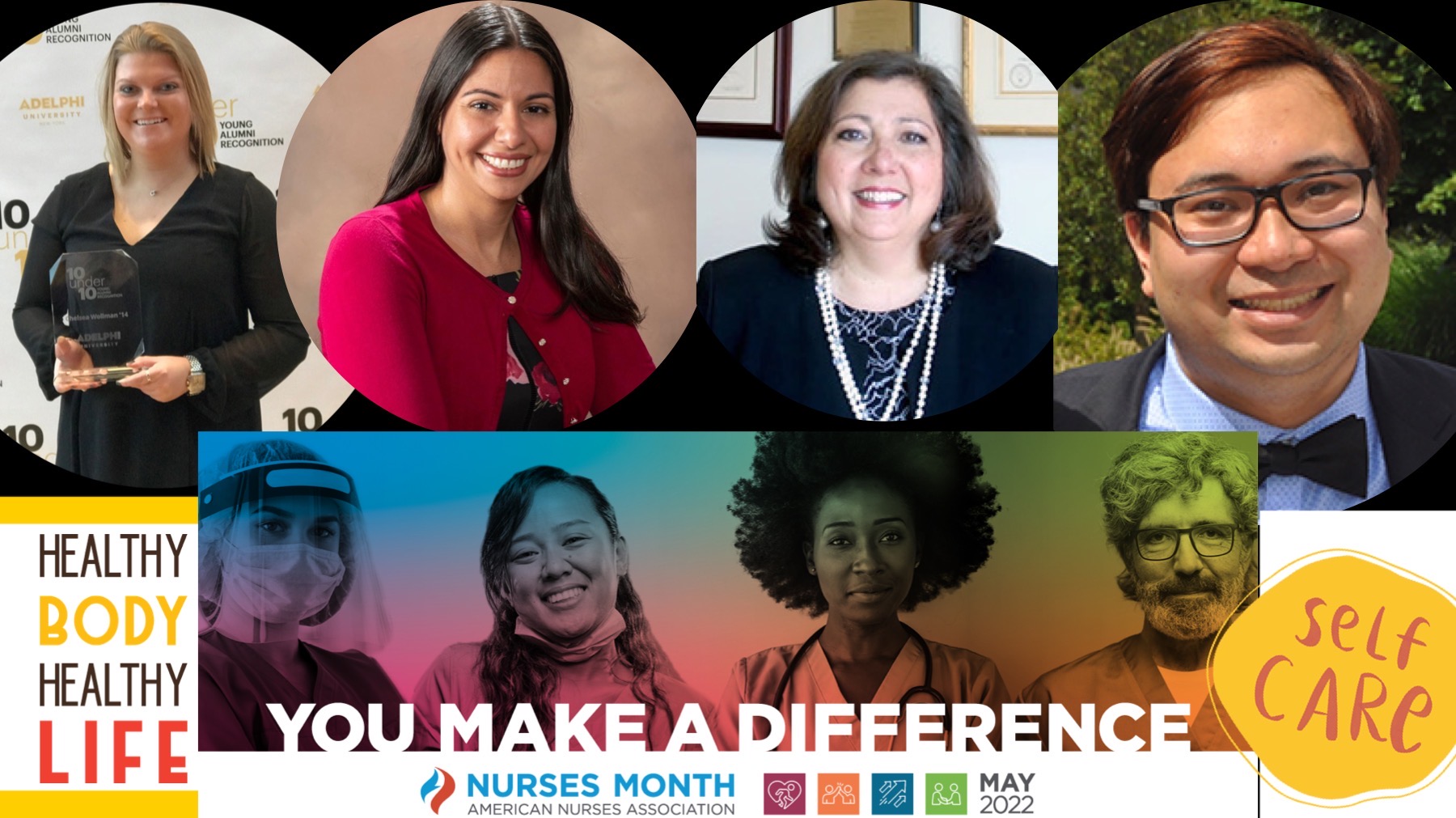
Self-care—a growing movement in the nursing profession—is not selfish. It doesn't just alleviate nurses' own on-the-job stress and burnout; it can also improve the quality of the care nurses give their patients.
This point was recently discussed by a virtual panel of nursing alumnae at the virtual event titled “Healthy Nurses, Healthy Communities.” The event was the final one for the College of Nursing and Public Health’s (CNPH) Nurses Week 2022. The week of events tied in with the American Nurses Association’s designation of May as Nurses Month, the theme of which was “Reset Your Wellness: Learning to Embrace Self-Care.”
The College’s all-alumnae panel—Marissa Abram ’08, PhD ’17, assistant professor; Deborah Ambrosio-Mawhirter ’81, MS ’95, EdD, clinical associate professor; Chelsea Wollman Imbriano ’14, neurological ICU registered nurses at North Shore University Hospital; and Maryann Forbes, PhD ’99, CNPH interim dean—was “so well received at Adelphi’s Women’s Leadership Conference in March” that they were brought “back by popular demand” for Nurses Week, as Dr. Forbes observed. This time, she handled introductions and added Edwin-Nikko Kabigting, PhD, assistant professor, as moderator.
“Prioritizing self-care is extremely important,” said Dr. Ambrosio-Mawhirter. Though it’s “a commitment to one’s self,” she stressed, “self-care is not selfish.” She told the 24 Zoom attendees that, to be of use to patients, “the caretakers have to take care of themselves.”
Imbriano added that self-care means “finding and making time for yourself,” something she conceded she was not good at until the pandemic. For a bedside ICU nurse like herself, she said, “Burnout is a real thing.” But she eventually overcame it. Smiling, she added that her earnings also enabled her to afford trips to the spa and buy a Peloton.
Asked by Dr. Kabigting how self-care has changed during COVID-19, Dr. Abram said the pandemic “shed light” on the need for caring for one’s well-being. Early in the pandemic, Dr. Ambrosio-Mawhirter, like other nurses, felt that she “didn’t deserve” self-care, a notion that’s since changed. “We had to give ourselves permission” to care for ourselves.
“We do see improvements,” Dr. Abram said, “but we have work to do.” She also noted that “the pandemic has inherently caused significant impact on mental health.”

Will the Self-Care Trend Last?
Some employers, like Northwell Health, have invested in ways to help their staffs care for themselves, for instance, with a lavender room where staff members can relax during shifts, Imbriano said.
When Dr. Kabigting questioned whether such employer interest would outlast the pandemic, the panel was unsure. Dr. Abram said nurses themselves are part of the problem and must first change their own cultural mindset of “sucking it up,” as she put it, and instead acknowledge stress and recognize the need to “replenish and restore.”
Imbriano hoped that self-care efforts will continue well beyond the pandemic but “only time will tell. We also have to meet them halfway and be our own advocates in order to maintain a work/life balance.”
Dr. Ambrosio-Mawhirter cited as other positive developments the American Nurses Association’s self-care/well-being initiative Healthy Nurse/Healthy Nation and the upsurge in telehealth. She also pointed out that some well-being initiatives began long before COVID-19 struck. A decade ago, she recalled, an employer had a meditation room and aromatherapy for employees.
Looking ahead, Dr. Abram said, “We’re the largest segment of the healthcare industry … We need to express that power … . I have a lot of hope.” Dr. Ambrosio-Mawhirter noted that the College is putting self-care into the curriculum as a way to get a head start on stemming burnout.
“We have come a long way,” Imbriano said, “but we still have a long way to go.” As another positive sign, Dr. Ambrosio-Mawhirter pointed out that Google searches for the term “self-care” have quadrupled in recent years.
Sharing Their Self-Care Tips
Dr. Abram said that since COVID-19, she runs or takes brisk walks, and noted that even “when I do meditation, I do walking meditation.”
Dr. Ambrosio-Mawhirter prefers nature walks, listening to music and cooking. “Unfortunately, that has some side effects sometimes,” she joked. She added that you can add things to your work routine—like parking farther away from your workplace, taking the stairs instead of the elevator or eating a healthy lunch.
Imbriano’s routine varies day to day. A Panthers soccer player while at Adelphi, she said she likes exercising but now also opts for “the massage-and-facial route.” She also praises having a dog, saying that hers is “a very good listener.”
Near the Zoom’s end, a student attendee, junior Melody Yeung, president of the Adelphi University Student Nurses Association (AUSNA), asked if, next semester, the panelists could set up a monthly student-oriented Zoom discussion like this one. Imbriano liked the idea and called it potentially “a huge asset for the students.”